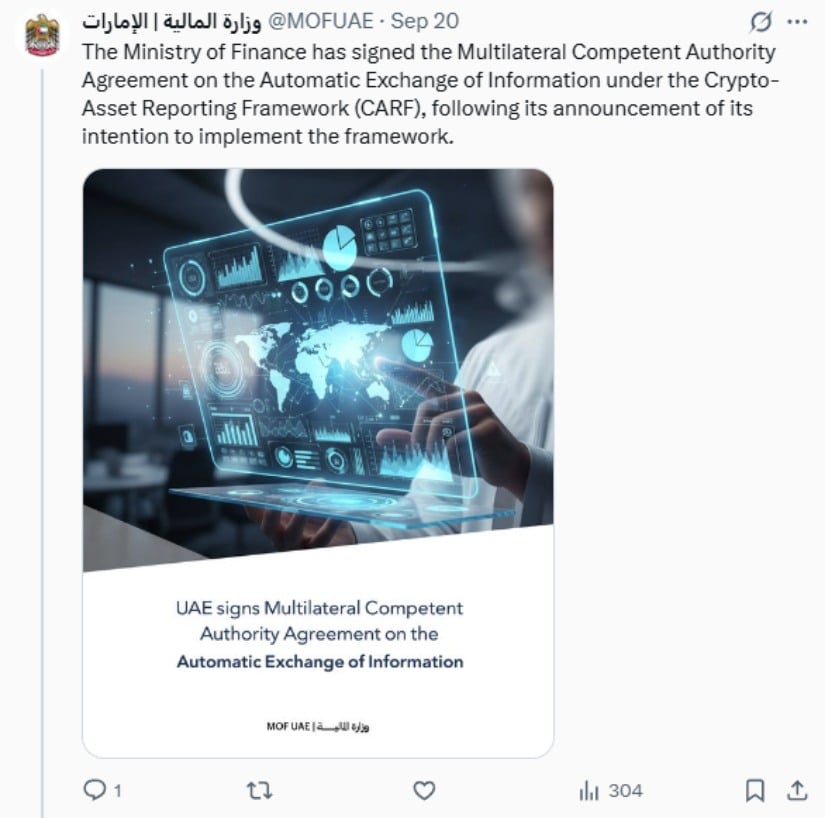
The UAE Ministry of Finance announced it signed the Multilateral Competent Authority Agreement under the Crypto-Asset Reporting Framework (CARF). This framework was created by the Organisation for Economic Cooperation and Development (OECD).
The new rules will start in 2027. By 2028, the UAE will begin sharing crypto tax data with other countries that signed the same agreement.
What CARF Means for Crypto Users
CARF works like the reporting rules banks already follow. Crypto exchanges, brokers, and wallet providers must collect information about their customers. This includes details about buying, selling, and transferring digital assets.
Tax authorities will then share this information with other countries. This helps them track people who try to hide crypto profits from taxes.
The system covers most cryptocurrencies, including Bitcoin and Ethereum. It also includes tokens and non-fungible tokens (NFTs) that can be traded. However, it does not cover central bank digital currencies.
Nitesh Mishra, co-founder of ChaiDEX, said the agreement “brings greater legal clarity and certainty to crypto activities in the UAE, making the environment safer for compliant investors.”
UAE’s Crypto-Friendly Approach
The UAE has been working to become a major crypto hub. In 2024, the country removed VAT taxes from many crypto activities. Dubai also created clear rules for Web3 companies.

Source:@MOFUAE
The CARF agreement does not change the UAE’s tax-free status for residents. People living in the UAE still do not pay income tax on crypto profits. The country only requires sharing information with other nations’ tax authorities.
This matters for foreign investors using the UAE as a base. If someone from the United States or United Kingdom holds crypto in UAE exchanges, their home country will receive reports about those holdings.
Benjamin Young, a business expert at Aston VIP, said the agreement “reinforces the country’s commitment to global regulatory alignment and transparency in digital assets.”
How It Works in Practice
The UAE is asking the crypto industry to help shape the final rules. The government opened a public consultation period from September 15 to November 8, 2025. Crypto exchanges, traders, and service providers can share their views about how the rules should work.
The OECD framework requires detailed record-keeping. Crypto service providers must verify customer identities and track transaction histories. They also need systems to report this data to tax authorities.
Companies will have three years to prepare their systems before reporting begins. This gives them time to update their technology and train staff on the new requirements.
Global Movement Toward Transparency
The UAE joins a growing list of countries implementing CARF. Switzerland plans to share crypto tax data with 74 partner countries. South Korea finalized its agreement in September 2025. Australia and the Netherlands are also preparing their own versions.
The European Union requires all member states to adopt similar rules by January 2026. Even the United States is considering joining, though it currently uses its own reporting system.
This global coordination aims to stop people from hiding money in crypto to avoid taxes. Before these rules, it was difficult for tax authorities to track crypto holdings across borders.
The timing reflects crypto’s growth from a niche technology to a mainstream financial tool. With more institutions and governments holding digital assets, regulators want the same transparency they have with traditional banking.
Preparing for Change
Crypto businesses in the UAE must start preparing now. They need to upgrade their know-your-customer processes and data management systems. The new rules require more detailed information than many companies currently collect.
For individual crypto users, the changes mean less privacy but more legitimacy. People who properly report their crypto taxes should not face problems. However, those who have been hiding crypto profits may face investigations from their home countries.
The UAE’s approach balances innovation with compliance. The country wants to attract crypto businesses while meeting international standards for financial transparency.
Industry experts expect the rules to increase institutional investment in crypto. Large companies and investment funds prefer clear regulations over uncertain legal environments.
The New Reality
The UAE’s decision to join CARF marks a major shift in how governments handle crypto taxation. The days of using digital assets to hide money offshore are ending.
However, this creates opportunities too. Countries with clear, fair crypto rules will likely attract more legitimate business. The UAE’s combination of tax advantages and regulatory clarity positions it well for this new era.


 2 hours ago
6
2 hours ago
6 










 Bengali (Bangladesh) ·
Bengali (Bangladesh) ·  English (United States) ·
English (United States) ·